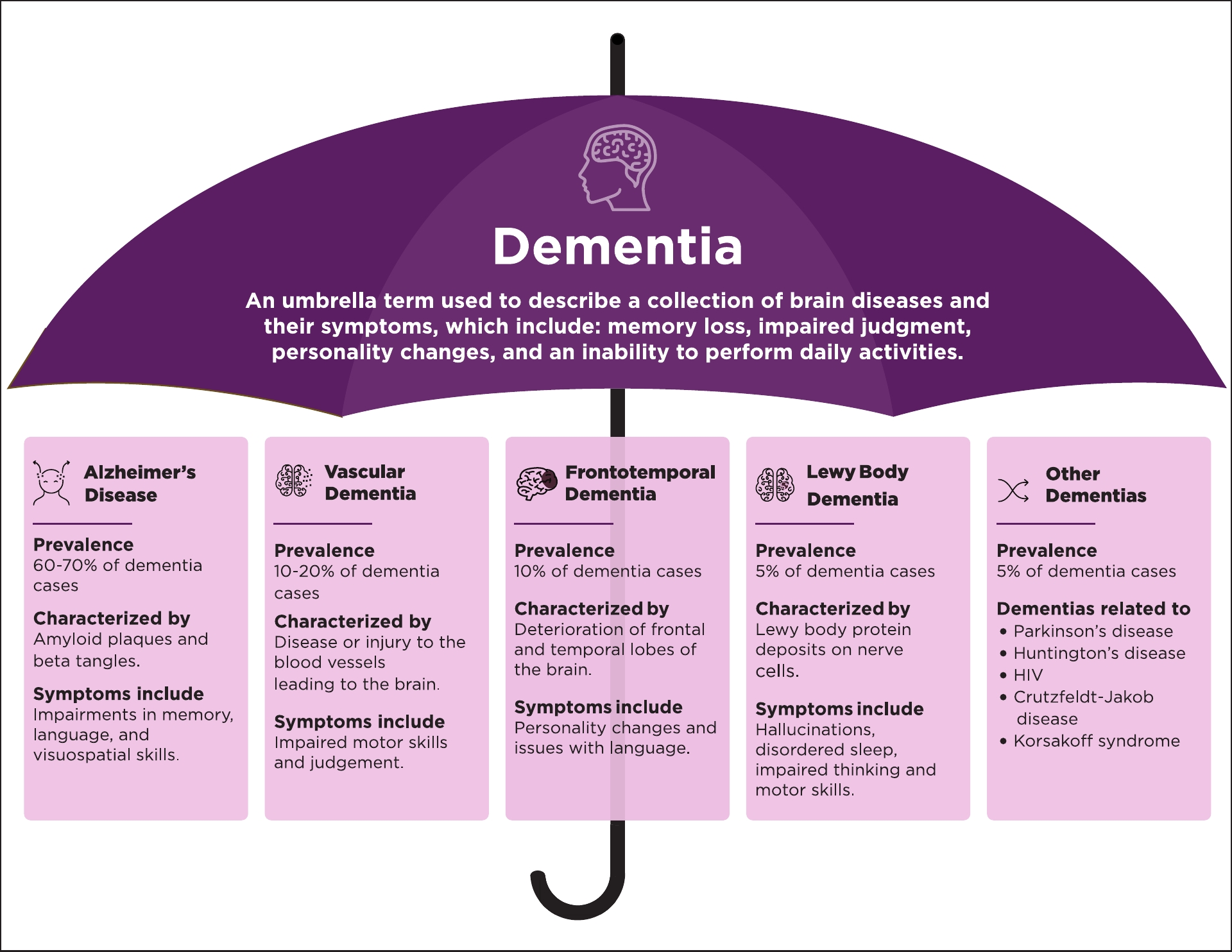Most people have heard the term “dementia,” but few are aware of what it really means. Dementia is not a specific medical condition. Rather, it is an umbrella term for a collection of brain diseases with similar symptoms and effects.
What All Forms of Dementia Have in Common
The reason that dementia is used as an umbrella term to refer to multiple diseases is that all of the problems that fall under the umbrella have certain things in common. All forms of dementia involve memory loss, personality changes, and impaired judgment that eventually get in the way of a person’s ability to perform basic daily activities. Unfortunately, most forms of true dementia are also degenerative, meaning they get worse over time and are not curable.
Common Types of Dementia
There are many forms of dementia, but some are more common than others. It’s important for family caregivers to learn how to recognize the differences between different types of dementia to provide better care for their loved ones. The key things everyone should know about the five most common types of dementia are described below.
Alzheimer’s Disease
Alzheimer’s disease affects over five million older Americans and accounts for between 60 and 70 percent of all dementia cases. Physiologically, Alzheimer’s disease is characterized by the formation of what are known as amyloid plaque and beta tangles in the brain. However, Alzheimer’s is typically diagnosed using a process of elimination that rules out other conditions that cause similar symptoms, the most recognizable of which are memory impairment, loss of visual-spatial skills, and language difficulties.
Vascular Dementia
Vascular dementia is the second most common type of brain disease affecting older adults. It accounts for 10 to 20% of all dementia cases and is caused by injury to or a disease of the blood vessels that lead into the brain, which can lead to strokes and damage to white matter. The most common symptoms of vascular dementia include impaired judgment and motor skills. Memory loss is much less common with this form of brain disease than it is with Alzheimer’s.
Frontotemporal Dementia
Around 10% of dementia cases can be characterized as frontotemporal dementia, which, as the name implies, refers to a deterioration of the nerve cells and connections formed in the frontal and temporal lobes. Technically, frontotemporal dementia is a group of diseases rather than a single brain disorder, but because the affected areas of the brain are associated with behavior, personality, and language use, people with different types of damage usually exhibit similar symptoms. Those symptoms almost always include personality changes and language problems.
Lewy Body Dementia
Patients with Lewy body dementia develop clumps of proteins known, unsurprisingly, as Lewy bodies. This form of dementia accounts for five percent of all cases. Its symptoms include disordered sleep, hallucinations, impaired thinking, and loss of motor skills.
Other Dementias
The four categories of dementia described above account for 95% of all cases. However, there are also several other causes of dementia that, while less common, can have an equally devastating impact on the affected person’s quality of life. They include:
- Parkinson’s disease
- Huntington’s disease
- Crutzfeldt-Jakob disease
- Korsakoff syndrome
- HIV-associated dementia
Unfortunately, some of these less common forms of dementia affect people of all ages. Regardless of whether dementia sets in during the later years of a person’s life or has an earlier onset, they will usually require increasing levels of advanced care moving forward.
How to Mitigate Dementia Risks
While dementia cannot necessarily be prevented, there are ways for people of all ages to reduce their risk. It’s especially important for older adults to take these steps:
- Avoid isolation by socializing with family and friends frequently.
- Eat a balanced diet to maintain a healthy weight.
- Quit smoking, if applicable.
- Establish and stick with an exercise plan that involves getting plenty of physical activity.
- Address underlying health conditions that could increase risks such as diabetes and heart disease.
Some people are more likely to develop dementia than others. Those with a family history of any form of dementia, for example, are at higher risk, as are people who suffer from depression, substance use disorders, and certain types of health conditions. When in doubt, speak with a primary care physician and ask for a referral to a neurologist or a geriatrician who specializes in dementia care and prevention.
How to Get Help for Loved Ones
Have an aging parent or another elderly loved one who is suffering from one of the forms of dementia described above? There are resources available to help at Summerfield of Redlands. This assisted living and memory care community provides a caring, supportive environment for seniors suffering from all types of dementia. Call (909) 783-9500 to learn more and schedule a tour.

